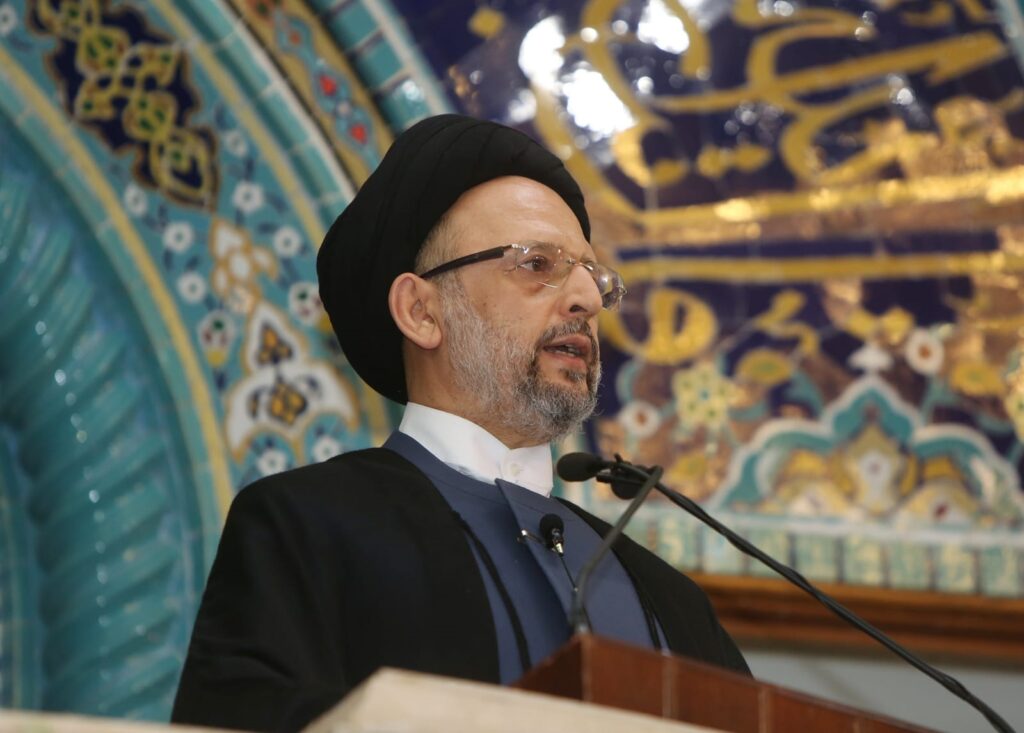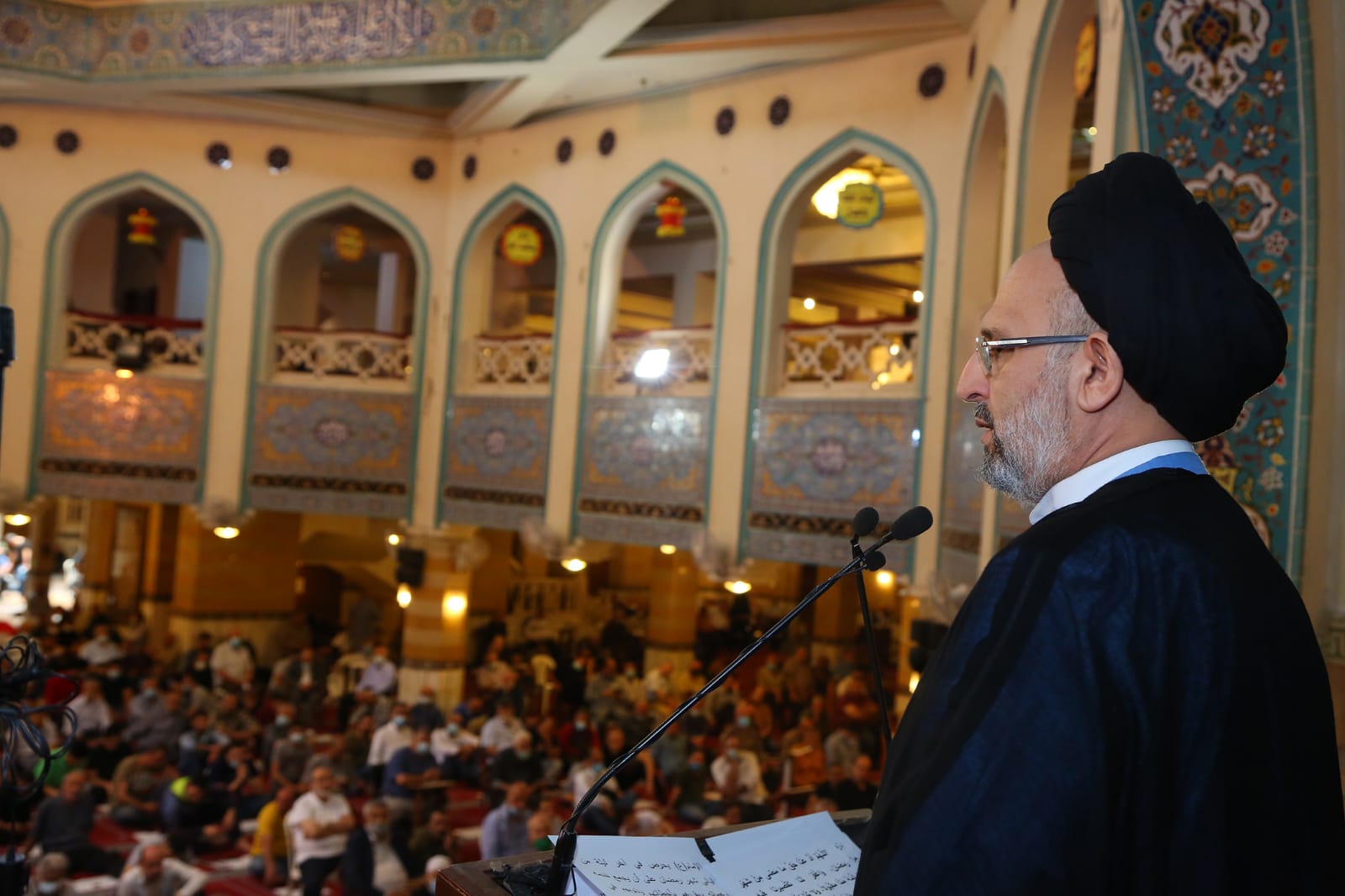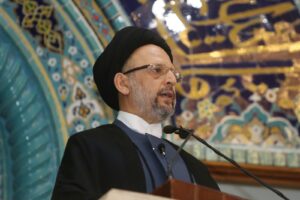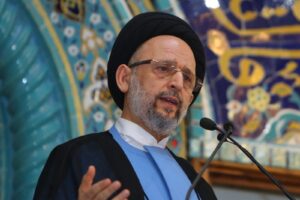In The Name of Allah, The Compassionate, The Merciful.
His Eminence, Sayyed Ali Fadlallah, delivered the two Friday prayer sermons at the Imamain Al-Hassanain Mosque, Shawal 17, 1445 /April 26, 2024. Several prominent religious scholars, dignitaries, and hundreds of believers attended the Jumu’a prayer. Following is a summary of the sermons.
The First Sermon
The Battle of Uhud: Lessons and morals
Allah, the Most Exalted, says in His Glorious Book: “Indeed, Allah fulfilled His promise to you when you were about to annihilate them by His permission until when you lost courage and disagreed about the order and disobeyed after He had shown you that which you love. Among you are those who desire this world, and among you are those who desire the Hereafter. Then He turned you away from them that He might test you. And He has already forgiven you, and Allah is the possessor of bounty for the believers.” [Quran 3:152]
On the fifteenth of Shawwal, in the third year of Hijrah the Battle of Uhud occurred. Quraish initiated it as revenge for their crushing defeat at the Battle of Badr, which happened a year prior.
The tribe prepared everything to secure victory in this battle, including manpower and resources. They assembled an army of 3,000 fighters equipped with sufficient weapons and gear. They even brought women and children along to motivate the fighters and ensure their resolve in the battlefield, preventing them from fleeing.
News of the Quraish’s march reached the Prophet (p.). He began preparations to confront them. He faced two choices: fight from within Medina or outside. He consulted his companions on this matter, as was his usual practice. The Prophet used to consult his companions on decisions regarding war and peace, following the command of Allah the Almighty: “And consult them in the matter. Based on this consultation, the prevailing opinion was to go out and meet the Quraish army before they reached Medina.
Indeed, the Muslims, who numbered no more than 700 fighters, met Quraish army near Mount Uhud, on the outskirts of Medina. In his military strategy, the Prophet positioned his army with Mount Uhud at their backs, serving as a natural barrier and protecting the army from behind. However, a gap remained on the right flank of the army. The Prophet feared the enemy might infiltrate and surprise them from there.
Therefore, he took steps to ensure this gap, which was a hill later named the “Hill of Archers,” was firmly closed. He stationed 50 skilled archers there under the command of Abdullah ibn Jubayr, and instructed them, “Repel the cavalry from us with arrows! Don’t let them come at us from behind! Whether victory is ours or theirs…
The battle commenced. Not much time passed before Quraish were defeated, laying down their arms and fleeing the battlefield, leaving behind a significant amount of spoils.
Here, the unexpected happened. One of the archers yelled, “The spoils! The spoils before someone else takes them!” He left his position, and others followed him out of greed for the spoils, leaving only ten archers on the hill. They disregarded their commander’s warning, who reminded them of the Prophet’s (ﷺ) words and his instructions not to leave this location under any circumstances.
At this time, Khalid ibn al-Walid, one of the leaders of the polytheist army, was lying in wait, keeping a watchful eye on this gap. The sight of the exposed hill presented an opportunity for him to charge at it. He killed the commander of the archers, Abdullah ibn Jubayr, and the few archers who remained with him. Then, he surprised the Muslims from behind with his division.
This turn of events led to the martyrdom of seventy companions, including Hamza ibn Abdul-Muttalib, the uncle of the Prophet, and Mus’ab ibn Umayr. Many others were wounded, and the Prophet himself was injured. He was almost killed, but for the small group that stood defending him and warding off the arrows, swords, and spears directed at him. Here, the role of Imam Ali (a.s.) is noteworthy. Due to the intensity of his fight and defense of the Prophet, his sword broke. The Prophet then gave him his sword, “Zulfiqar.” Ali continued fighting until Gabriel descended upon the Prophet and proclaimed, “There is no hero except Ali, and there is no sword except Zulfiqar!” Meanwhile, most of the Muslim army fled, each one trying to save himself, especially after they heard someone say, “Muhammad has been killed!” Muslims.
The Battle of Uhud was a difficult test for the Muslims, not because they lacked courage or fighting spirit, nor because they weren’t prepared to sacrifice or lacked awareness and faith in the message of Islam. This is evident in those who remained steadfast on the battlefield.
A companion named Anas bin Nadr exemplifies this. When he saw many fleeing the battlefield after hearing rumors of Muhammad’s death, he said to them, “People! Even if Muhammad has been killed, the Lord of Muhammad has not been killed! So fight for what he fought for, and die for what he died for!” He then fought until he was martyred.
However, the defeat, as mentioned earlier, was a result of failing to adhere to one of the conditions for victory. Some left their assigned positions, which the Prophet had ordered them to remain in, due to greed for spoils. Others fled the battlefield to save themselves.
Therefore, the Holy Quran repeatedly urges them in many verses to address the reasons that led to the defeat after victory, as mentioned in the verse we recited: “And you disobeyed after He showed you what you loved. Among you were those who desired the world, and among you were those who desired the Hereafter.”
The Quran also soothes their wounds, alleviates their suffering, and encourages them to regain their role and presence to face future challenges. It says: “And do not weaken and do not grieve, and you are superior if you are indeed believers.”
It reminds them that if a wound touched them, a similar wound touched the [disbelievers] at the Battle of Badr. Losing a round against the polytheists does not mean losing the battle if they work on addressing the reasons for it. The Quran says: “And if a wound touches you – then upon them a wound similar to it has touched. And those days We alternate them among the people…”
The verses also emphasize that the path to paradise is only achieved through jihad mixed with patience, steadfastness, and not breaking down in the face of pain when confronting challenges: “Or do you think that you will enter Paradise while you have not yet been tested with what was tested those before you? They were struck by poverty and hardship and conflict, and the Messenger and those who believed with him said, ‘When will the victory of Allah come?’ Is not Allah near [with them]?” [Quran 2:141]
The Quran responds to those who mourned the deaths of a great number of martyrs by saying: “And do not think of those who are killed in the way of Allah as dead. Rather, they are alive with their Lord, they are provided for, * rejoicing in what Allah has bestowed upon them of His bounty, and delighting in regard to those who have not yet joined them from behind – that they will not fear and they will not grieve.”
Beloved Ones: The Battle of Uhud Holds Many Lessons:
The most important one is that it is not enough to be on the right side, have a just cause, and be believers in order to achieve victory. We must also adhere to the conditions of it.
In the Battle of Uhud, the Muslims believed that simply entering the battle would guarantee their success and that angels would descend upon them as in Badr. Therefore, after their crushing defeat, they questioned God’s promise of victory for the believers. They wondered how they could lose the battle and be defeated while the Prophet was with them. Allah the Almighty responded: “And when a [similar] affliction befell you – you had already inflicted double its equivalent upon them. And you said, ‘From where is this?’ Say, ‘It is from yourselves.'”
Thus, the reason for the defeat is “from yourselves,” which happened when they did not adhere to the conditions for victory. These conditions include, on the one hand, adhering to the military plan, and on the other hand, freeing oneself from the love of this world, which led some Muslims to leave their positions to obtain spoils, and the fear of death on the other hand, when others fled the battle after hearing that Muhammad had been killed.
The Muslims learned the lesson of Uhud well and decided at that time to sell their lives for God and abandon the world when it comes at the expense of His pleasure. Therefore, their victories followed one another after that in the battles of the Trench, Khaybar, and the great victory they achieved by opening Mecca, and this is what we ask God to grant us until we achieve our victories…
Dear loved ones:
In the midst of the war waged directly or indirectly by the enemies against the nation, we must recall the lesson of Uhud, which urges us to block the gaps through which the enemies infiltrate into society to undermine its achievements and weaken it from within. We must ensure that there are no vulnerable points in the midst of this society due to poverty, ignorance, lack of faith, awareness, or division…
And we acknowledge that God is with us, supporting His religion and His people, and honoring the believers and the oppressed, provided that we support Him: ‘If you support Allah, He will support you and make your feet firm.'”
The second sermon
Worshippers of Allah, I advise you and advise myself In these days, to recall what happened to the Muslims after the Battle of Uhud. It is stated in history that after leaving Uhud and returning to Mecca triumphant, Abu Sufyan regretted his hastiness in returning before uprooting the roots of Islam from the city. He took advantage of the victory he achieved and the weakened morale of the Muslims due to the killings, wounds, and pains they suffered.
On that day, the Messenger of Allah (p.) learned of Abu Sufyan’s decision to invade Medina. He called upon his companions to confront Quraish and stand against them. They all went out; even the wounded among them went out, struggling with their injuries. When Abu Sufyan realized the determination of the Muslims and their high morale, he decided to retract his decision and return to Mecca content with the victory he had achieved.
The Quran records this fervor of the Muslims and their trust in Allah and reliance on Him, saying: “Those to whom the people [hypocrites] said, ‘Indeed, the people have gathered against you, so fear them.’ But it [merely] increased them in faith, and they said, ‘Sufficient for us is Allah, and [He is] the best Disposer of affairs.’ So they returned with favor from Allah and bounty, no harm having touched them“. These verses are not only referring to a singular event in history but intended to be ever-present in facing all challenges.
We begin with Gaza, where the enemy continues to target civilians and systematically destroy residential buildings and infrastructure, and the siege threatens the people of the region with famine. Despite international pleas, marches, and protests in many countries worldwide, the attacks persist. These protests have recently extended to prestigious universities in the United States and even to Europe and Australia, ignited by those affected by the situation in Palestine who are no longer fooled by misleading media and continue their activism despite arrests, threats of expulsion, and accusations of tarnishing their movement.
It is both laughable and tragic that they are accused of anti-Semitism when they come from various faiths and act out of humanitarian concern. It is clear that what emboldens this entity is the continued support from many countries worldwide, as recently seen in the massive military aid provided by the United States, allowing the enemy to continue its atrocities and war on Gaza. The American President’s justification for this aid is to safeguard US national security.
The attempt to cover this support by wishing this entity would allow humanitarian aid to pass disregards the ongoing killing, destruction, and displacement. It is as if the blockade is the only problem facing the Palestinian people and the sole reason for their suffering.
Meanwhile, the Palestinian people continue to exhibit patience, resilience, heroism, and steadfastness in their positions against this entity, confusing the enemy and making it unable to maintain its ground in the face of their resistance operations. This steadfastness has led to internal negative reactions within the entity, with its leadership exchanging accusations regarding who bears responsibility for the failures in the Operation Flood of Al-Aqsa, which continued despite two hundred days of war, ultimately leading to the resignation of the enemy’s military intelligence chief, likely followed by more resignations.
In light of all this, we reaffirm our pride in the Palestinian people and their resistance despite the magnitude of the wounds they suffer, which the enemy seeks to deepen. However, we are confident that a people like this cannot be defeated, and they will impose their conditions on this entity and compel it to retreat from its actions.
Simultaneously, we call upon Arab and Islamic countries and their people not to abandon this people and to not underestimate the power they demonstrate every day. Allowing this entity to achieve its goals will have consequences that extend anywhere its army can reach.
We turn to Lebanon, where resistance continues to support the Palestinian people and respond to the enemy’s attacks on civilians, residential buildings, and safe villages, while the enemy continues to threaten Lebanon.
In the face of these events, we renew our call to the Lebanese people not to succumb to the enemy’s attempts to widen divisions among them and to trust in the capabilities that they possess. We hope they stand united, and if they cannot agree on supporting Gaza, at least they should agree to prevent the enemy from violating Lebanese sovereignty and imposing its conditions on the Lebanese people. They should not direct their efforts against those who are currently confronting this enemy, weakening the Lebanese position.
Lastly, with Labor Day approaching on May 1st, we extend our congratulations to all workers, expressing our appreciation for their efforts and work. They should know that the hand they work with is loved by God and His Messenger, a hand that builds nations and contributes to their prosperity.
It’s unfortunate that this holiday comes at a time when workers in this country are suffering from a difficult economic situation and extreme inflation, as well as from the Zionist enemy’s attacks.
We ask God to alleviate their burden and make their future better than their past…





